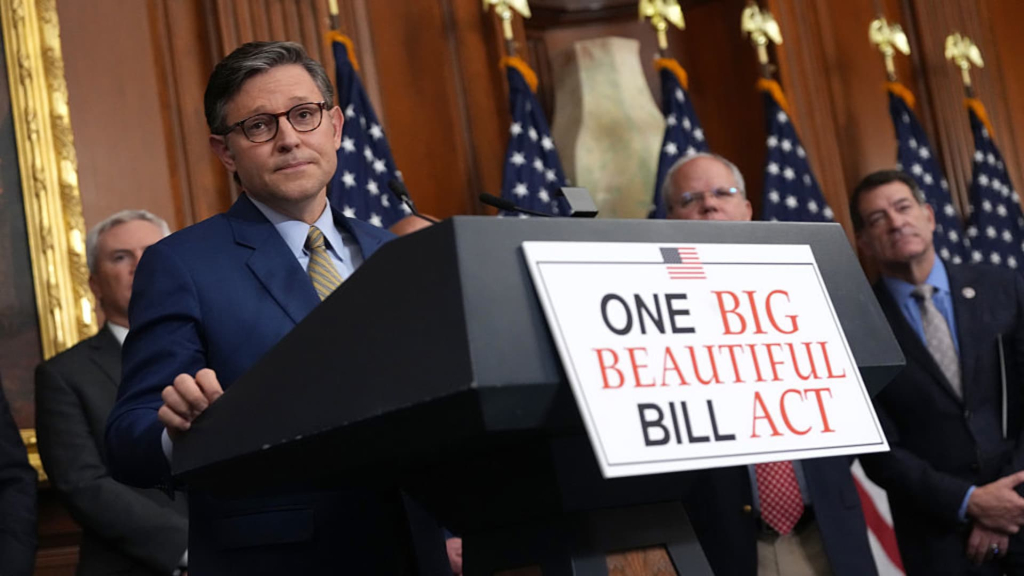U.S. fund managers are actively engaging Congress regarding a specific provision within President Donald Trump’s tax legislation, expressing concerns that it might prompt foreign investors to hastily divest from American markets.
The legislation, known as the “One Big Beautiful Bill Act,” was approved by the U.S. House of Representatives in May and seeks to impose penalties on foreign-owned companies operating in the United States that originate from nations deemed to have “unfair foreign taxes.” This initiative is currently under consideration in the Senate.
The Investment Company Institute (ICI), which advocates for American fund management entities, is urging Congress to amend the proposed tax bill, asserting that its current form would adversely affect a substantial amount of foreign investments circulating within U.S. stock markets, as revealed in documents reviewed by Finance Newso.
“To avoid consequences tied to Section 899, portfolio investors may swiftly withdraw from U.S. equities, resulting in capital outflows that would detrimentally impact the U.S. economy,” stated the ICI in a letter addressed to Senator Mike Crapo, chairman of the Senate Finance Committee, on June 5. “Sustained selling by foreign investors could lead to a decline in U.S. equity markets, ultimately harming American companies and investors alike.”
Understanding Section 899
Section 899 is designed to implement retaliatory tax measures against firms from countries that impose taxes such as the Digital Services Tax and adhere to the OECD’s global minimum tax regulations. If enacted, this provision could impact investors from the European Union, the United Kingdom, Canada, Australia, and Switzerland, among others.
The tax is set to commence at a rate of 5%, increasing by five percentage points each year until it reaches a maximum of 20%, in addition to existing taxes that vary by country based on international tax treaties. This could significantly impact returns for foreign investors in U.S. equities.
Unintended Consequences
In their correspondence, the ICI highlighted that the U.S. fund management sector, which has invested approximately $18 trillion in the U.S. stock markets, could inadvertently suffer from the ramifications of Section 899.
“We believe that the proposed wording of Section 899 should be refined to clarify its scope and not deter foreign investment in U.S. equity markets via investment vehicles like U.S. mutual funds and ETFs, as well as their foreign counterparts (e.g., UCITS funds),” the ICI stated.
The letter further elaborated, “Section 899 would impose penalties on these funds and their shareholders by taxing passive income derived from U.S. equity investments, thereby positioning investment funds as collateral damage in the broader aims of Section 899.”
Fund management companies generally operate on a fee structure based on assets under management, and a potential exodus of foreign investors spurred by concerns over Section 899 could result in diminished revenues for these firms.
Responses from the Senate Finance Committee have been limited, with Senator Mike Crapo’s office not providing comments on the issue when contacted by Finance Newso.
According to data compiled by Apollo Global Management, foreign entities hold $19 trillion in U.S. stock markets, $7 trillion in U.S. government bonds, and $5 trillion in U.S. credit.
While the ICI largely supports U.S. efforts to safeguard domestic business interests abroad and address discriminatory foreign taxation, it expresses caution that the current version of the bill may be counterproductive.
“Some foreign governments might welcome an outflow of capital from the United States, as it benefits their local equity markets, which runs counter to the incentives that Section 899 is intended to create,” the letter argued.
Rethinking U.S. Investments
Yuri Khodjamirian, chief investment officer at Tema ETFs, voiced concerns that investors in Europe focused on U.S. companies that distribute dividends will thoroughly evaluate their investment strategies in light of these developments.
“If you suddenly find yourself liable for taxes on your income, why would you choose to hold that stock?” Khodjamirian questioned, noting that Tema ETFs manages the American Reshoring ETF, accessible to both U.S. and international professional investors.
Tax professionals indicate that earnings allocated to foreign investors are more susceptible to taxation under Section 899 compared to capital gains or other distribution methods for shareholders.
Khodjamirian added that, while the implications for the U.S. equities market may not be substantial, especially since companies in the S&P 500 are not traditionally recognized for their dividend payouts, “In the U.S., dividend yields are generally low. Many companies prefer to repurchase shares instead.”


























